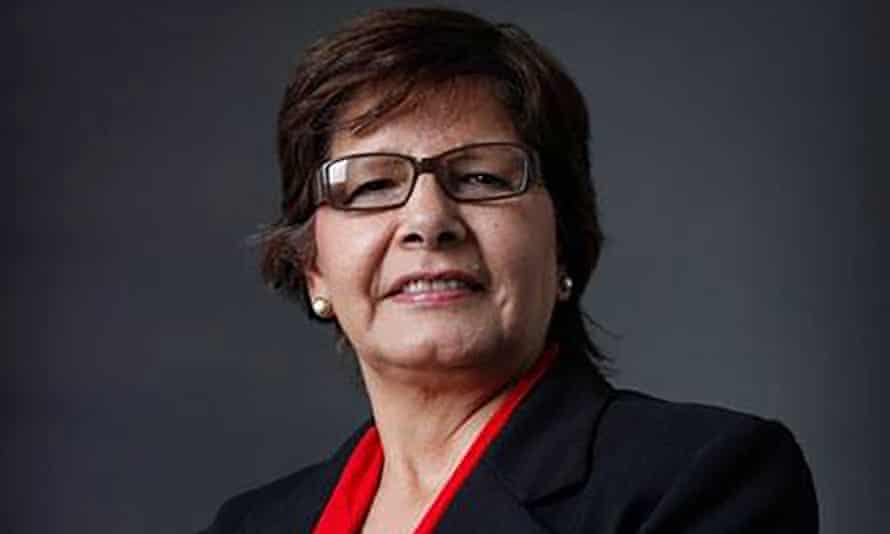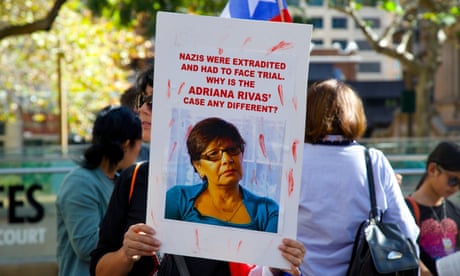AUSTRALIA/CHILE: Adriana Rivas, una mujer satánica
Adriana Rivas: Sydney woman and alleged Pinochet agent loses appeal to avoid extradition to Chile
Retired nanny is accused of being involved in the disappearance of seven people in the 1970s

Former Sydney nanny Adriana Rivas has lost her appeal against extradition to Chile to face charges of aggravated kidnapping allegedly committed during the reign of military dictator Augusto Pinochet.
Rivas is facing seven counts of aggravated kidnapping relating to the disappearance, and presumed murder, of seven members of Chile’s communist party, including its leader, Victor Diaz, who disappeared in 1976.
Rivas is alleged to have been a member of the shadowy Lautaro Brigade and involved in the torture and disappearance of political opponents of the Pinochet dictatorship.
Rivas’s legal team had fought her extradition for many years, arguing the allegations against her were “political” and therefore not extraditable. She said the seven were not kidnapped but legitimately arrested.
A Sydney magistrate in October dismissed those objections and ruled Rivas was eligible for extradition.
In the federal court on Thursday morning, justice Wendy Abraham dismissed Rivas’s application for a review and confirmed the extradition order.
Rivas, who appeared via video link, did not speak during the short hearing.
She could still potentially appeal to the full bench of the federal court and the high court. She has denied the allegations and consistently maintained her duties within the National Intelligence Directorate, known by its Spanish acronym DINA, were purely administrative.
Rivas has been living in Australia since 1978. She was living in the Sydney beachside suburb of Bondi, and working as a nanny and a cleaner, before her arrest in February 2019. She had previously been arrested in Chile but escaped and fled back to Australia.
In Chile, after more than 40 years, families are still searching for answers:
Maria Luisa Ortiz, the daughter of disappeared party member Fernando Ortiz – who vanished from a Santiago street in December 1976 – said the families of the vanished were grateful to those in Australia who had campaigned for Rivas to be brought before a court.
“We are very happy with this news, thank you so much for fighting for a little part of justice,” Ortiz said.
“This is a big step and a lesson for the world. On this day, 24 June, it would have been my father’s birthday, it is the best present for him.”
Pilar Aguilera, head of the national campaign for truth and justice in Chile – Australia, said families still grieving missing loved ones were celebrating the court’s decision.
“Our gratitude and acknowledgement to the families of these victims. Our commitment was always to them, to continue our work.”
Aguilera said the families would now await Rivas’s extradition to Chile to face a fair trial – “a right the victims did not receive”. “We acknowledge that today’s decision is subject to further appeals by Rivas but our commitment will not waiver and we continue to seek truth and justice,” she said.
Court documents from Chile’s appeal court provided to Australian courts allege Rivas worked as an agent of DINA’s Lautaro Brigade after taking a course in intelligence.
A minute from Chile’s interior ministry says the brigade was established to target members of the communist party which opposed Pinochet’s military regime.
The Chilean police report alleges Rivas was a brigade member involved in the commission of “forced entres, detention, interrogations and application of torture”, all of which she denies.
The report states the brigade used metal bunk beds rigged with electrical current and detainees were repeatedly shocked all over their bodies. They were injected with unknown substances or “suffocated by asphyxiating them with plastic bags”.
Chile’s interior ministry wrote in court documents: “It is important to emphasise the cruelty of the crimes committed.”
“Prisoners were … interrogated under torture by applying electric current in different parts of the body. The premises were even used to develop advanced killing techniques such as the preparation of sarin gas.
“They had a team of medical doctors checking the health condition of prisoners to decide if they could still stand torture. Dead bodies were burnt [on] their fingerprints and face with a welding torch; this was done inside the empty swimming pool. Then, the bodies were put inside sacks, tied-up with cables to a piece of railway beam and then thrown into the ocean by Air Force helicopters.”
In 2013, as part of a documentary series marking 40 years since Pinochet’s ascension to power in a coup, Rivas granted an interview to SBS television.
She said she had worked at the Simon Bolivar Center but insisted she was not involved in interrogating detainees.
“Not guilty. Not guilty. If I ... look, I never had the opportunity to be where the detainees were. Never, understand? All my work was as a secretary or security. Nothing more.”
In the same interview, she confirmed the use of torture against opponents of the regime. “Everyone knew they had to do that to the people in order to break them because communists would not talk. It was necessary,” Rivas said.
Rivas said she did not regret working for the National Intelligence Directorate.
“That’s why I say the best years of my youth was when I lived in the DINA. I do not regret having worked there because for me it was a job. It was a chance to survive. Understand?”


Comentarios
Publicar un comentario